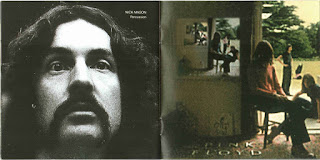Ummagumma is the fourth album by the English rock band Pink Floyd. It is a double album and was released on 7 November 1969 by Harvest Records in the United Kingdom and by Capitol Records internationally. The first disc consists of live recordings from concerts at Mothers Club in Birmingham and the College of Commerce in Manchester that contained part of their normal set list of the time, while the second contains solo compositions by each member of the band recorded at the Abbey Road Studios. The artwork was designed by regular Floyd collaborators Hipgnosis and features a number of pictures of the band combined to give a Droste effect.
Although the album was well received at the time of release, and was a top five hit in the UK album charts, it has since been looked upon unfavourably by the band, who have expressed negative opinions about it in interviews. Nevertheless, the album has been reissued on CD several times, along with the rest of their catalogue.
The album's title supposedly comes from Cambridge slang for sex, commonly used by Pink Floyd friend and occasional roadie, Iain "Emo" Moore, who would say "I'm going back to the house for some ummagumma". According to Moore, he made up the term himself.
The album was the first album by the band released on the Harvest label. The cover artwork shows a Droste effect featuring the group, with a picture hanging on the wall showing the same scene, except that the band members have switched positions. The cover of the original LP varies between the British, American/Canadian and Australian releases. The British version has the album Gigi leaning against the wall immediately above the "Pink Floyd" letters. At a talk given at Borders bookstore in Cambridge on 1 November 2008, as part of the "City Wakes" project, Storm Thorgerson explained that the album was introduced as a red herring to provoke debate, and that it has no intended meaning. On most copies of American and Canadian editions, the Gigi cover is airbrushed to a plain white sleeve, apparently because of copyright concerns, but the earliest American copies do show the Gigi cover, and it was restored for the American remastered CD edition. On the Australian edition, the Gigi cover is completely airbrushed, not even leaving a white square behind. The house used as the location for the front cover of the album is located in Great Shelford, near Cambridge.
On the rear cover, roadies Alan Styles (who also appears in "Alan's Psychedelic Breakfast") and Peter Watts are shown with the band's equipment laid out on a taxiway at Biggin Hill Airport. This concept was proposed by Mason, with the intention of replicating the "exploded" drawings of military aircraft and their payloads, which were popular at the time.
There is a slight difference between the British and North American editions in the way the titles on the back are laid out, the most important difference being the inclusion of subtitles for the four sections of "A Saucerful of Secrets". These subtitles only appeared on American and Canadian editions of this album, but not on the British edition, nor did they appear on original pressings of A Saucerful of Secrets.
The inner gatefold art shows separate black-and-white photos of the band members. Gilmour is seen standing in front of the Elfin Oak. Original vinyl editions showed Waters with his first wife, Judy Trim, but she has been cropped out of the picture on most CD editions (with the original photo's caption "Roger Waters (and Jude)" accordingly changed to just "Roger Waters"). The uncropped picture was restored for the album's inclusion in the box set Oh, by the Way.
Ummagumma was released in the UK and US on 7 and 8 November 1969, respectively. It reached number 5 on the UK albums chart and number 74 in the US, marking the first time the band reached the top 100 there. The album was certified gold in the US in February 1974 and platinum in March 1994. American versions of the cassette retained only "Astronomy Domine" from the live set and omitted the three other tracks. In 1987, the album was re-released on a two-CD set. A digitally remastered version was issued in 1994.
In 2009, to mark the 40th anniversary of the album's release, Thorgerson sold a limited number of autographed lithographs of the front cover. Although the 2011 re-release campaign Why Pink Floyd...? presented all fourteen albums newly remastered in 2011, only the studio disc of Ummagumma was remastered – the live disc is the previous 1994 version. Both the live and studio album were re-issued in 2016 with Pink Floyd Records label.
































No hay comentarios.:
Publicar un comentario